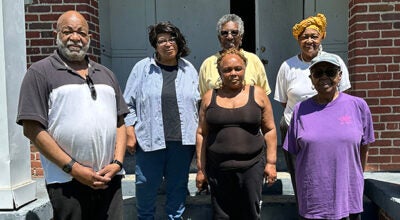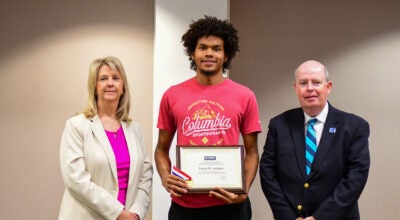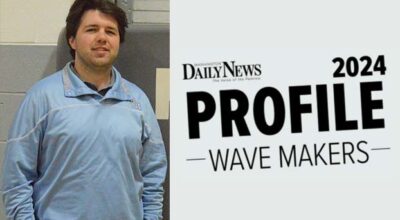NAME CHANGER: Arts Council expands its mission as Arts of the Pamlico
Published 6:21 pm Saturday, August 1, 2015
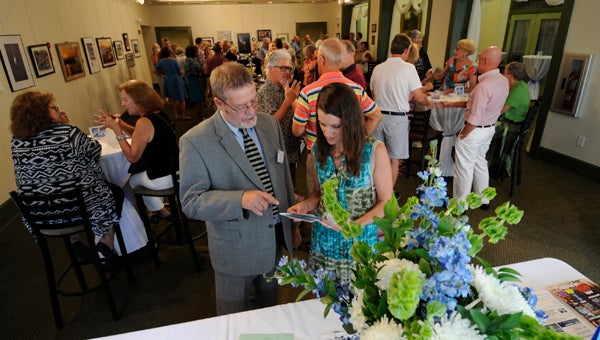
VAIL STEWART RUMLEY | DAILY NEWS
INTRODUCTION: Arts of the Pamlico Executive Director Joey Toler explains the expanding mission of organization at a reception held at the Turnage Theatre on Thursday.
ARTS OF THE PAMLICO
NEW LOOK: Beaufort County Arts Council has evolved into Arts of the Pamlico and has a new logo to go with the arts organization’s regional mission.
As of Thursday, the Beaufort County Arts Council is no more. The organization has changed its name, its look and its outreach to encompass a larger, regional arts community as Arts of the Pamlico.
“Arts of the Pamlico means we are signaling to the larger community that we are not nearly confined to Beaufort County,” said John Tate, immediate past chair of the organization.
For 43 years, BCAC served as an advocate for the arts and brought the art experience to all corners of the county. According to Joey Toler, executive director of Arts of the Pamlico, the rebranding represents the evolution of the organization — one that started with the purchase of the historic Turnage Theatre in downtown Washington.
“I suppose the real message here is that this is not your grandmother’s arts council,” Toler said. “We are still committed to the arts in all mediums, and to serving the citizens of Beaufort County in their own communities, but having our flagship location at the Turnage Theatre has expanded our reach to include a more regional audience, so this is one way we are adapting to that new role.”
The idea for a name change first came up in a BCAC Board of Directors’ retreat in 2007, since BCAC was already acting as a regional arts council, overseeing grant funds designated to both Hyde and Washington counties. However the timing didn’t seem right then, Toler said, so the idea was put on hold. At this year’s Board retreat, the situation had changed: a name change had started to look like a matter of practicality. There was a need to clarify the merging of the theatre — a completely separate entity before its closure in 2011 — and the arts council.
“After the arts council purchased the Turnage, we were sort of struggling because people continued to call us the Turnage,” Tate said. “People were used to two different organizations and, in fact, were confused by the fact that we weren’t the Turnage.”
Thursday evening arts advocates gathered at the theater to learn about the organization’s new mission as Arts of the Pamlico. Along with the name change, a new season of programming was introduced, along with the Arts of the Pamlico’s new website, a new membership structure and the implementation of the Constituent Relationship Management system, or CRM, which will help the organization communicate more effectively with its members and supporters, Toler said.
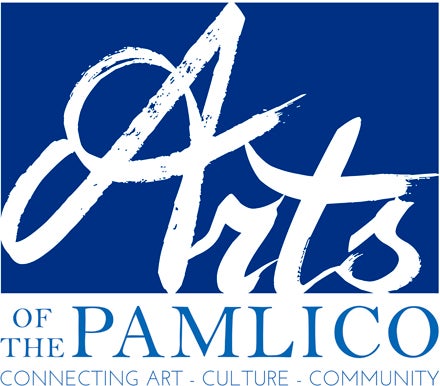
ARTS OF THE PAMLICO
NEW LOOK: Beaufort County Arts Council has evolved into Arts of the Pamlico and has a new logo to go with the arts organization’s regional mission.
“This has been a huge learning curve for us, and we always hear from people who say they never know what is going on at the theatre,” Toler said. “This new system should streamline that process, so as long as our patron information is current and correct, we should be able to easily get the word out about what is happening in the community, and at the Turnage specifically.”
But most important to the leadership of Arts of the Pamlico is making the theater itself a thriving hub for regional arts, encouraging other arts groups and presenters to take advantage of the space for their own uses.
“We are now tasked with making sure the theatre is utilized as much as possible, and that people attend the theatre, and that means bringing in programming that will appeal to a broad and diverse audience,” Toler said. “We are still growing into that role.”
Toler said he is optimistic about the future of Arts of the Pamlico, and the future of the arts in the region and in communities. He believes that since the Turnage reopened in January of 2014, the impact on downtown has been significant and will continue to be so.
“We hope this change represents an integration of all that is good about the Beaufort County Arts Council and all that is good about the Turnage and what the venue brings to the table,” Toler said.
“It’s our hope that people who both have been invested in the past in the Turnage and have been invested in past in the Beaufort County Arts Council will appreciate the change as a positive, moving forward and expansion of the original vision,” Tate said. “We certainly respect and honor the contributions of all the folks who have gotten us to that point in both organizations, so this is more a continuation, not an obliteration (of the past).”


